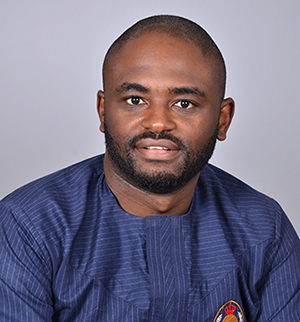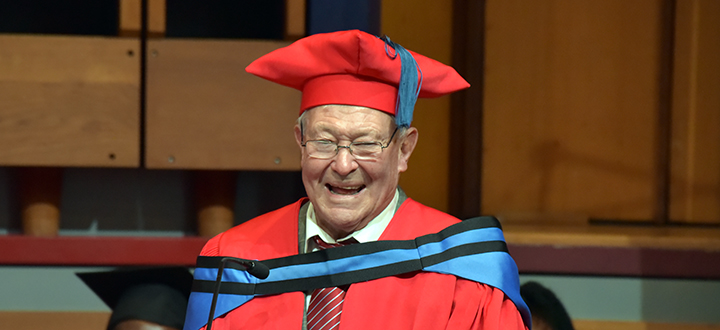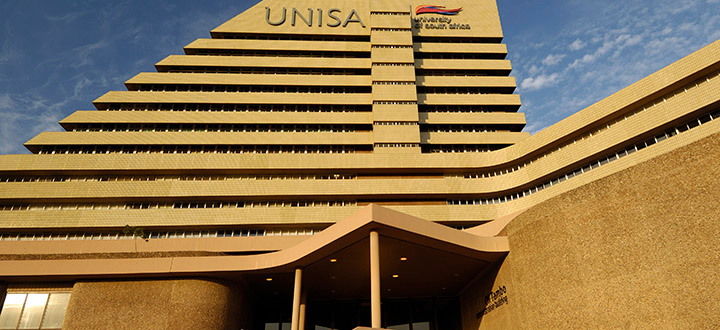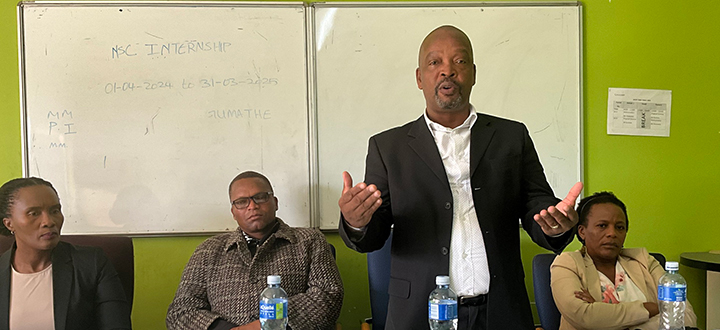College of Law
Cutting-edge research on African issues acknowledged

Prof Babatunde Fagbayibo (CLAW: Unisa) has been re-rated as a C2 researcher by the NRF
After holding a National Research Foundation (NRF) Y2 rating from 2015 to 2020, Prof Babatunde Fagbayibo of Unisa’s College of Law (CLAW) has done it again, but this time advanced to a C2 rating.
"One of the things that I have learnt in my academic journey is the importance of interdisciplinary research, especially the understanding that my research can benefit from other disciplines. The other is the importance of critical, Afrocentric engagement. In this respect, I have come to appreciate the ideas around centring pan-African thoughts in devising policy and research strategies for enhancing Africa’s development." Fagbayibo’s work has been published in academic journals, online blogs and newspapers within and outside the African continent.
After moving from Nigeria to South Africa to study for an undergraduate degree in Law at Unisa 19 years ago, little did Fagbayibo know that he would, in future, be an esteemed academic at the institution. "I am a proud Unisa alumnus," he says. He later moved to the University of Pretoria (UP) for his postgraduate studies where he obtained both his LLM and LLD degrees. His doctoral degree was in public law, with an emphasis on continental integration in Africa.
Speaking about his re-rating, he remarks: "It is an achievement that I am happy about. It speaks to my academic journey and the painstaking work I have put into working on issues in my field of study. It is also a reminder of the fact that one is not an island, as other people have contributed, either directly or indirectly, to my research journey."
Africa at the core of his research
His current research focuses on two critical issues, the first being the feasibility of building continental supranationalism in Africa, concerning which he recently completed a manuscript. He elaborates: "My research looks at the possibility of granting more assertive powers to the African Union (AU) in order to achieve many of its developmental objectives. I focus mainly on the institutional dimension of this process, especially the strategies of ensuring the legitimacy of AU institutions and how they methodically oversee the implementation of integration goals."
For Fagbayibo, this point is very important considering the current institutional reform process at the AU, and how this has led to the signing and launch of the much talked about African Continental Free Trade Area (AfCFTA). He has also written, and is still writing, journal articles and blog pieces on the subject.
Fagbayibo’s second research focus is on critical approaches to international law in Africa. "It looks at ways in which the teaching and practice of international law in Africa should reflect critical epistemologies, be it in the form of the works of critical scholars or pre-colonial practices of internationality in Africa." Fagbayibo has written articles on this subject and other works are still being finalised.
He says: "At the core of both research engagements is the consideration of multi-inter-trans-disciplinary objectives, where I draw ideas from political science, anthropology, cultural studies, international relations, and political economy." In addition, Fagbayibo is involved in the mentoring of students and junior academics, within and outside the Unisa environment, who are working on issues related to these research topics.
Unisa’s support structure enables success
"The main benefit of this rating for my research is that it provides some validation for the work that has been done and serves as a motivation for engaging in more critical works going forward," says Fagbayibo. He adds that it calls for the importance of engaging in meaningful research and measuring the impact of research engagements by the extent to which it contributes to the quality of processes and thoughts in this field.
Expressing gratitude for the support that he receives from his college, Fagbayibo says: "I must also mention that since Unisa was one of the first universities on this continent to sign a memorandum of understanding (MoU) with the AU on the implementation of the AU’s Agenda 2063 programme, I consider this re-rating as one of the important aspects of such agreement." For him, it is in line with Unisa’s vision and sense of purpose regarding research and development in achieving the dream of an integrated African continent.
Advising aspiring researchers in his field, he says that "it is important to understand that law cannot continue to be studied in disciplinary isolation. We must study law from a multi-inter-trans-disciplinary perspective." He adds that it is imperative to not limit research outputs to traditional academic platforms. "Law researchers must be more conscious of the voice of the marginalised peoples in our society, and how legal processes impact them," concludes Fagbayibo.
* By Nancy Legodi, Acting Journalist, Department of Institutional Advancement
Publish date: 2021-04-08 00:00:00.0

 Community champion and agricultural entrepreneur extraordinaire honoured by Unisa
Community champion and agricultural entrepreneur extraordinaire honoured by Unisa
 Unisa remains anchored among the waves
Unisa remains anchored among the waves
 Inhlanyelo Hub explores sustainable tourism initiatives in Marico Biosphere Reserve
Inhlanyelo Hub explores sustainable tourism initiatives in Marico Biosphere Reserve
 Unisa KZN Region explores extending university services to KwaMpungose community
Unisa KZN Region explores extending university services to KwaMpungose community